Analysis of Quality of Life and Uncertainty in Illness for Nursing
VerifiedAdded on 2023/06/07
|6
|1370
|271
Report
AI Summary
This report examines the concept of quality of life (QOL) as a multidimensional construct influenced by various factors, including culture, perceptions, and social relationships, and its increasing importance in contemporary nursing practice for promoting health outcomes. It also discusses Mishel's Uncertainty in Illness Theory, a middle-range theory explaining how patients cognitively process illness-related stimuli and structure meaning around their experiences, particularly in acute or declining disease stages. The theory emphasizes assessment processes like inference and allusion, highlighting the role of social resources and healthcare providers in managing uncertainty. A case study of a 66-year-old patient with colon cancer illustrates the application of the theory in empowering patients to understand and overcome fear related to their illness. The report concludes by emphasizing the effectiveness of Mishel's theory in helping nurses alleviate patient uncertainty and improve overall disease management, suggesting further research into promoting certainty in clinical settings.
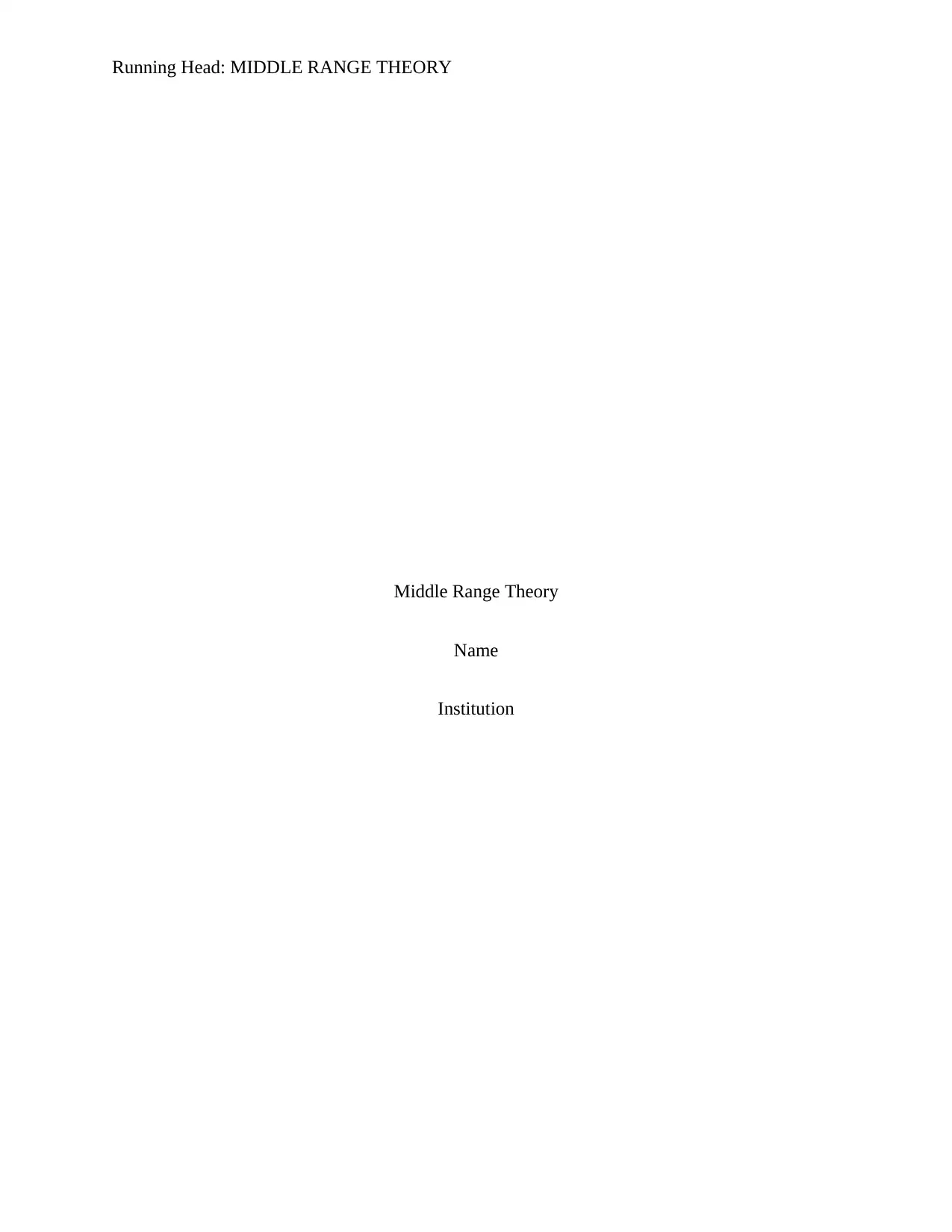
Running Head: MIDDLE RANGE THEORY
Middle Range Theory
Name
Institution
Middle Range Theory
Name
Institution
Paraphrase This Document
Need a fresh take? Get an instant paraphrase of this document with our AI Paraphraser
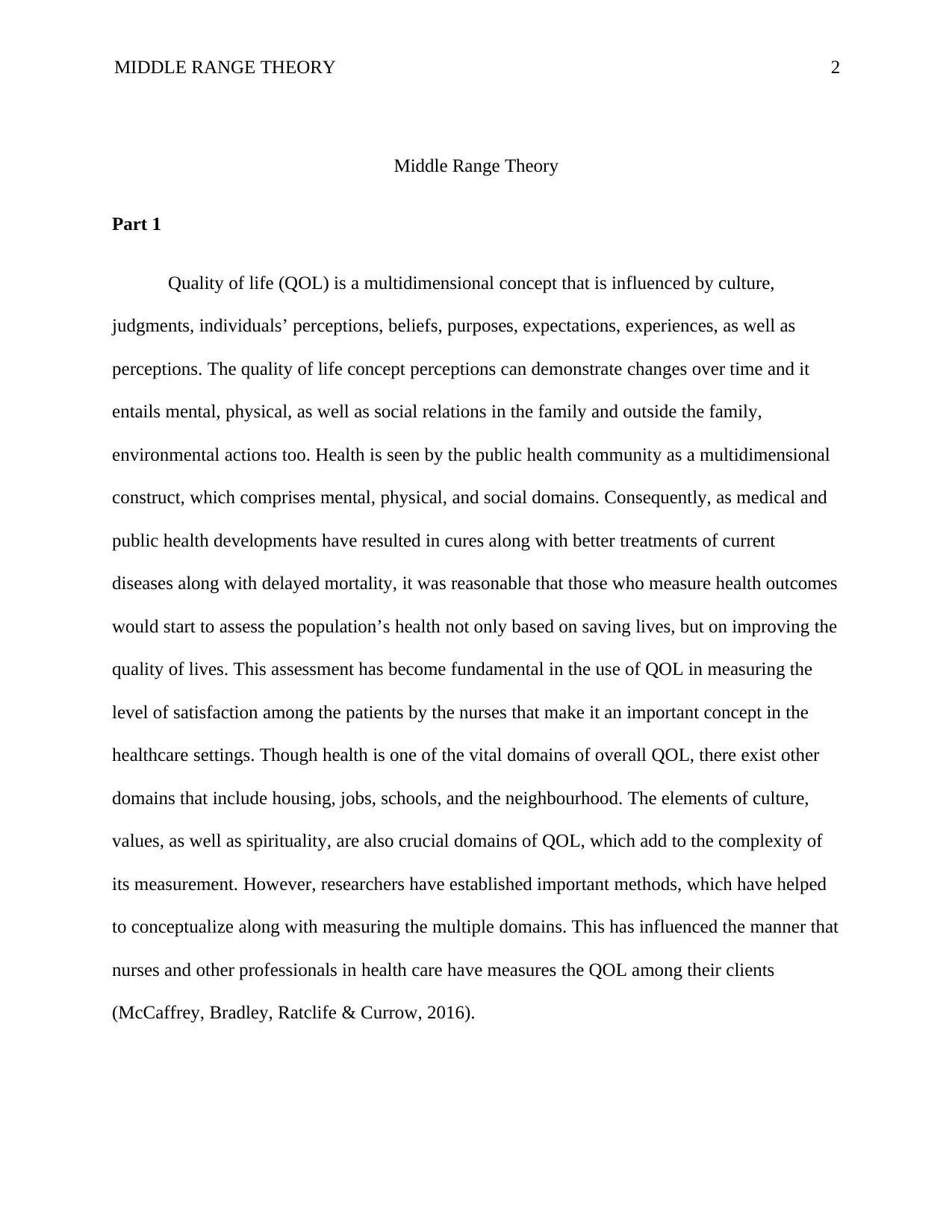
MIDDLE RANGE THEORY 2
Middle Range Theory
Part 1
Quality of life (QOL) is a multidimensional concept that is influenced by culture,
judgments, individuals’ perceptions, beliefs, purposes, expectations, experiences, as well as
perceptions. The quality of life concept perceptions can demonstrate changes over time and it
entails mental, physical, as well as social relations in the family and outside the family,
environmental actions too. Health is seen by the public health community as a multidimensional
construct, which comprises mental, physical, and social domains. Consequently, as medical and
public health developments have resulted in cures along with better treatments of current
diseases along with delayed mortality, it was reasonable that those who measure health outcomes
would start to assess the population’s health not only based on saving lives, but on improving the
quality of lives. This assessment has become fundamental in the use of QOL in measuring the
level of satisfaction among the patients by the nurses that make it an important concept in the
healthcare settings. Though health is one of the vital domains of overall QOL, there exist other
domains that include housing, jobs, schools, and the neighbourhood. The elements of culture,
values, as well as spirituality, are also crucial domains of QOL, which add to the complexity of
its measurement. However, researchers have established important methods, which have helped
to conceptualize along with measuring the multiple domains. This has influenced the manner that
nurses and other professionals in health care have measures the QOL among their clients
(McCaffrey, Bradley, Ratclife & Currow, 2016).
Middle Range Theory
Part 1
Quality of life (QOL) is a multidimensional concept that is influenced by culture,
judgments, individuals’ perceptions, beliefs, purposes, expectations, experiences, as well as
perceptions. The quality of life concept perceptions can demonstrate changes over time and it
entails mental, physical, as well as social relations in the family and outside the family,
environmental actions too. Health is seen by the public health community as a multidimensional
construct, which comprises mental, physical, and social domains. Consequently, as medical and
public health developments have resulted in cures along with better treatments of current
diseases along with delayed mortality, it was reasonable that those who measure health outcomes
would start to assess the population’s health not only based on saving lives, but on improving the
quality of lives. This assessment has become fundamental in the use of QOL in measuring the
level of satisfaction among the patients by the nurses that make it an important concept in the
healthcare settings. Though health is one of the vital domains of overall QOL, there exist other
domains that include housing, jobs, schools, and the neighbourhood. The elements of culture,
values, as well as spirituality, are also crucial domains of QOL, which add to the complexity of
its measurement. However, researchers have established important methods, which have helped
to conceptualize along with measuring the multiple domains. This has influenced the manner that
nurses and other professionals in health care have measures the QOL among their clients
(McCaffrey, Bradley, Ratclife & Currow, 2016).
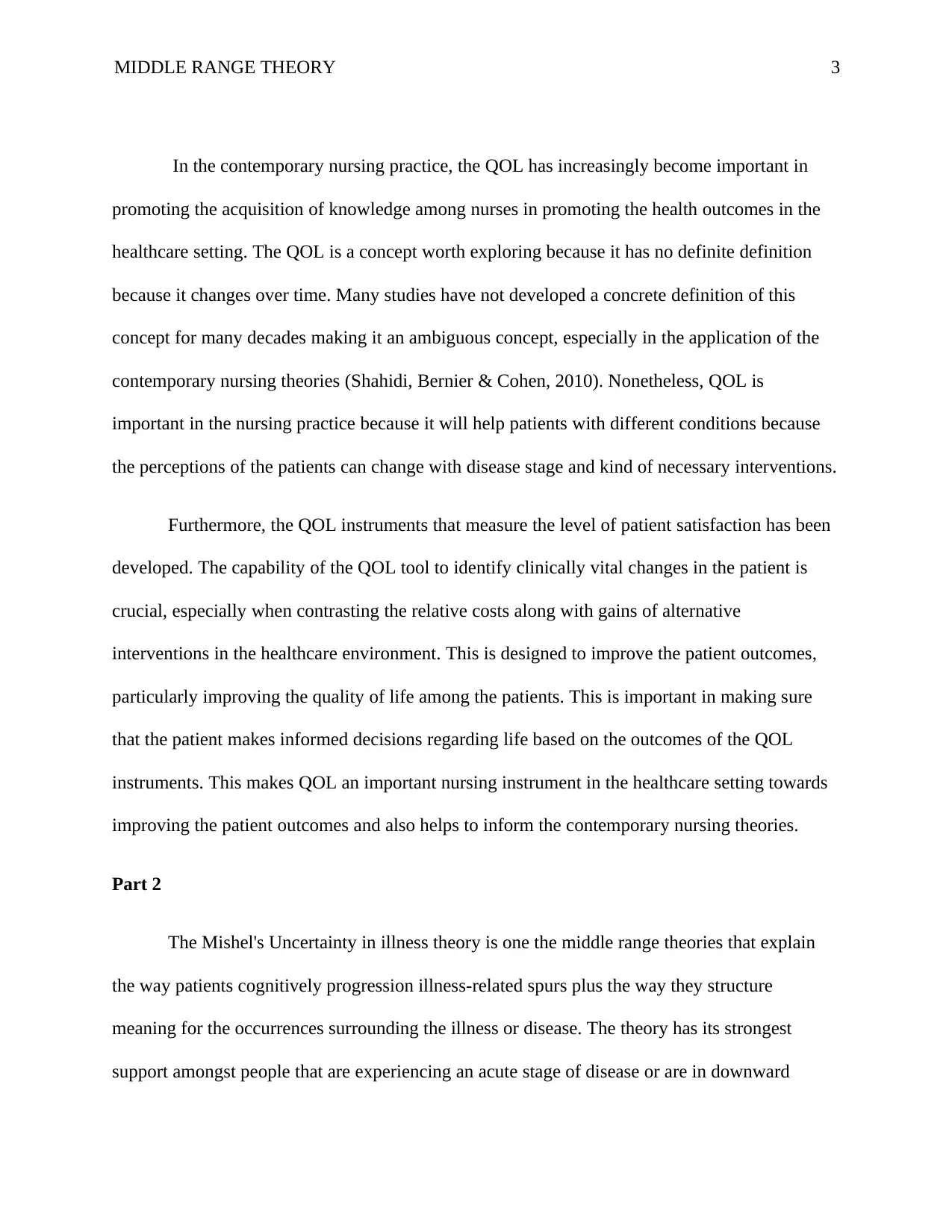
MIDDLE RANGE THEORY 3
In the contemporary nursing practice, the QOL has increasingly become important in
promoting the acquisition of knowledge among nurses in promoting the health outcomes in the
healthcare setting. The QOL is a concept worth exploring because it has no definite definition
because it changes over time. Many studies have not developed a concrete definition of this
concept for many decades making it an ambiguous concept, especially in the application of the
contemporary nursing theories (Shahidi, Bernier & Cohen, 2010). Nonetheless, QOL is
important in the nursing practice because it will help patients with different conditions because
the perceptions of the patients can change with disease stage and kind of necessary interventions.
Furthermore, the QOL instruments that measure the level of patient satisfaction has been
developed. The capability of the QOL tool to identify clinically vital changes in the patient is
crucial, especially when contrasting the relative costs along with gains of alternative
interventions in the healthcare environment. This is designed to improve the patient outcomes,
particularly improving the quality of life among the patients. This is important in making sure
that the patient makes informed decisions regarding life based on the outcomes of the QOL
instruments. This makes QOL an important nursing instrument in the healthcare setting towards
improving the patient outcomes and also helps to inform the contemporary nursing theories.
Part 2
The Mishel's Uncertainty in illness theory is one the middle range theories that explain
the way patients cognitively progression illness-related spurs plus the way they structure
meaning for the occurrences surrounding the illness or disease. The theory has its strongest
support amongst people that are experiencing an acute stage of disease or are in downward
In the contemporary nursing practice, the QOL has increasingly become important in
promoting the acquisition of knowledge among nurses in promoting the health outcomes in the
healthcare setting. The QOL is a concept worth exploring because it has no definite definition
because it changes over time. Many studies have not developed a concrete definition of this
concept for many decades making it an ambiguous concept, especially in the application of the
contemporary nursing theories (Shahidi, Bernier & Cohen, 2010). Nonetheless, QOL is
important in the nursing practice because it will help patients with different conditions because
the perceptions of the patients can change with disease stage and kind of necessary interventions.
Furthermore, the QOL instruments that measure the level of patient satisfaction has been
developed. The capability of the QOL tool to identify clinically vital changes in the patient is
crucial, especially when contrasting the relative costs along with gains of alternative
interventions in the healthcare environment. This is designed to improve the patient outcomes,
particularly improving the quality of life among the patients. This is important in making sure
that the patient makes informed decisions regarding life based on the outcomes of the QOL
instruments. This makes QOL an important nursing instrument in the healthcare setting towards
improving the patient outcomes and also helps to inform the contemporary nursing theories.
Part 2
The Mishel's Uncertainty in illness theory is one the middle range theories that explain
the way patients cognitively progression illness-related spurs plus the way they structure
meaning for the occurrences surrounding the illness or disease. The theory has its strongest
support amongst people that are experiencing an acute stage of disease or are in downward
⊘ This is a preview!⊘
Do you want full access?
Subscribe today to unlock all pages.

Trusted by 1+ million students worldwide
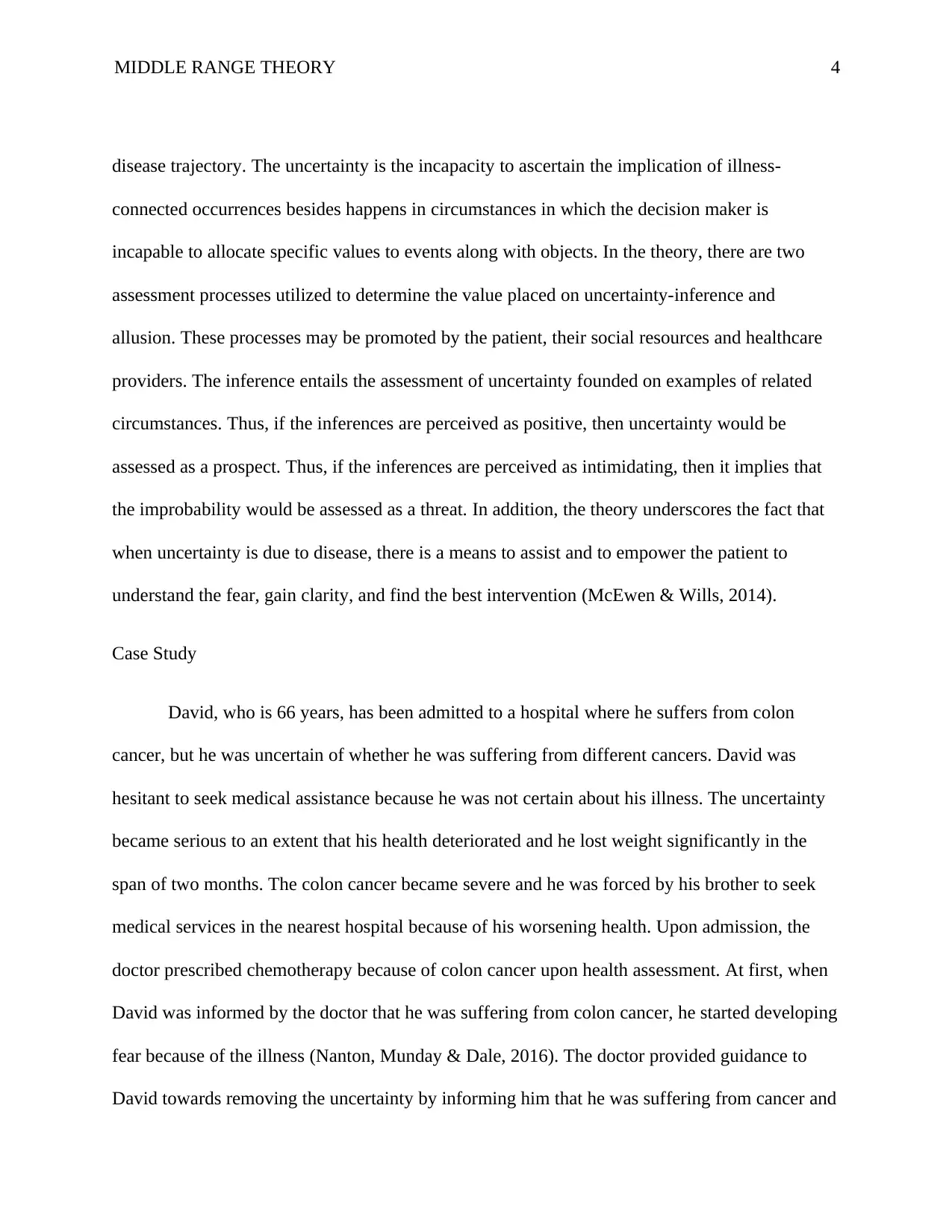
MIDDLE RANGE THEORY 4
disease trajectory. The uncertainty is the incapacity to ascertain the implication of illness-
connected occurrences besides happens in circumstances in which the decision maker is
incapable to allocate specific values to events along with objects. In the theory, there are two
assessment processes utilized to determine the value placed on uncertainty-inference and
allusion. These processes may be promoted by the patient, their social resources and healthcare
providers. The inference entails the assessment of uncertainty founded on examples of related
circumstances. Thus, if the inferences are perceived as positive, then uncertainty would be
assessed as a prospect. Thus, if the inferences are perceived as intimidating, then it implies that
the improbability would be assessed as a threat. In addition, the theory underscores the fact that
when uncertainty is due to disease, there is a means to assist and to empower the patient to
understand the fear, gain clarity, and find the best intervention (McEwen & Wills, 2014).
Case Study
David, who is 66 years, has been admitted to a hospital where he suffers from colon
cancer, but he was uncertain of whether he was suffering from different cancers. David was
hesitant to seek medical assistance because he was not certain about his illness. The uncertainty
became serious to an extent that his health deteriorated and he lost weight significantly in the
span of two months. The colon cancer became severe and he was forced by his brother to seek
medical services in the nearest hospital because of his worsening health. Upon admission, the
doctor prescribed chemotherapy because of colon cancer upon health assessment. At first, when
David was informed by the doctor that he was suffering from colon cancer, he started developing
fear because of the illness (Nanton, Munday & Dale, 2016). The doctor provided guidance to
David towards removing the uncertainty by informing him that he was suffering from cancer and
disease trajectory. The uncertainty is the incapacity to ascertain the implication of illness-
connected occurrences besides happens in circumstances in which the decision maker is
incapable to allocate specific values to events along with objects. In the theory, there are two
assessment processes utilized to determine the value placed on uncertainty-inference and
allusion. These processes may be promoted by the patient, their social resources and healthcare
providers. The inference entails the assessment of uncertainty founded on examples of related
circumstances. Thus, if the inferences are perceived as positive, then uncertainty would be
assessed as a prospect. Thus, if the inferences are perceived as intimidating, then it implies that
the improbability would be assessed as a threat. In addition, the theory underscores the fact that
when uncertainty is due to disease, there is a means to assist and to empower the patient to
understand the fear, gain clarity, and find the best intervention (McEwen & Wills, 2014).
Case Study
David, who is 66 years, has been admitted to a hospital where he suffers from colon
cancer, but he was uncertain of whether he was suffering from different cancers. David was
hesitant to seek medical assistance because he was not certain about his illness. The uncertainty
became serious to an extent that his health deteriorated and he lost weight significantly in the
span of two months. The colon cancer became severe and he was forced by his brother to seek
medical services in the nearest hospital because of his worsening health. Upon admission, the
doctor prescribed chemotherapy because of colon cancer upon health assessment. At first, when
David was informed by the doctor that he was suffering from colon cancer, he started developing
fear because of the illness (Nanton, Munday & Dale, 2016). The doctor provided guidance to
David towards removing the uncertainty by informing him that he was suffering from cancer and
Paraphrase This Document
Need a fresh take? Get an instant paraphrase of this document with our AI Paraphraser
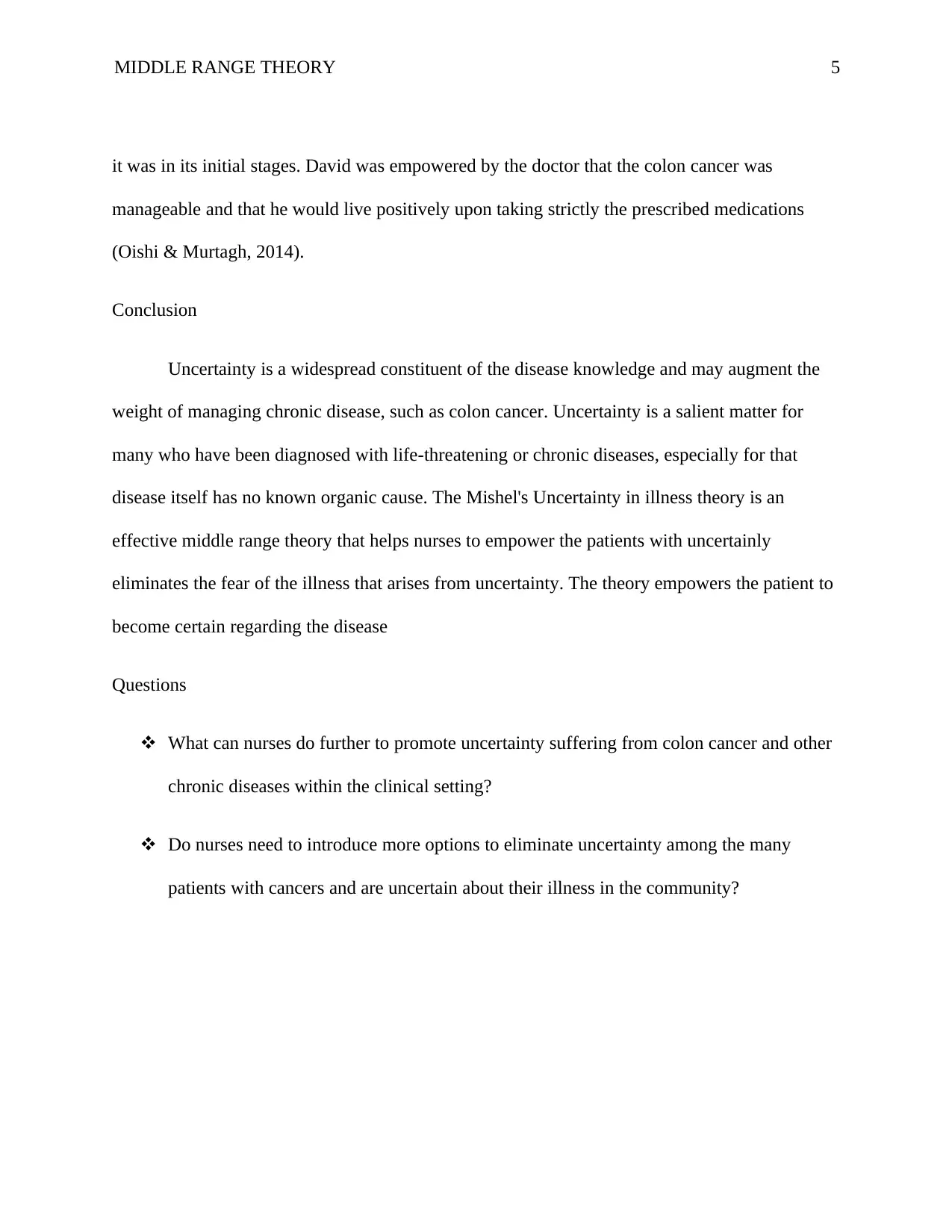
MIDDLE RANGE THEORY 5
it was in its initial stages. David was empowered by the doctor that the colon cancer was
manageable and that he would live positively upon taking strictly the prescribed medications
(Oishi & Murtagh, 2014).
Conclusion
Uncertainty is a widespread constituent of the disease knowledge and may augment the
weight of managing chronic disease, such as colon cancer. Uncertainty is a salient matter for
many who have been diagnosed with life-threatening or chronic diseases, especially for that
disease itself has no known organic cause. The Mishel's Uncertainty in illness theory is an
effective middle range theory that helps nurses to empower the patients with uncertainly
eliminates the fear of the illness that arises from uncertainty. The theory empowers the patient to
become certain regarding the disease
Questions
What can nurses do further to promote uncertainty suffering from colon cancer and other
chronic diseases within the clinical setting?
Do nurses need to introduce more options to eliminate uncertainty among the many
patients with cancers and are uncertain about their illness in the community?
it was in its initial stages. David was empowered by the doctor that the colon cancer was
manageable and that he would live positively upon taking strictly the prescribed medications
(Oishi & Murtagh, 2014).
Conclusion
Uncertainty is a widespread constituent of the disease knowledge and may augment the
weight of managing chronic disease, such as colon cancer. Uncertainty is a salient matter for
many who have been diagnosed with life-threatening or chronic diseases, especially for that
disease itself has no known organic cause. The Mishel's Uncertainty in illness theory is an
effective middle range theory that helps nurses to empower the patients with uncertainly
eliminates the fear of the illness that arises from uncertainty. The theory empowers the patient to
become certain regarding the disease
Questions
What can nurses do further to promote uncertainty suffering from colon cancer and other
chronic diseases within the clinical setting?
Do nurses need to introduce more options to eliminate uncertainty among the many
patients with cancers and are uncertain about their illness in the community?
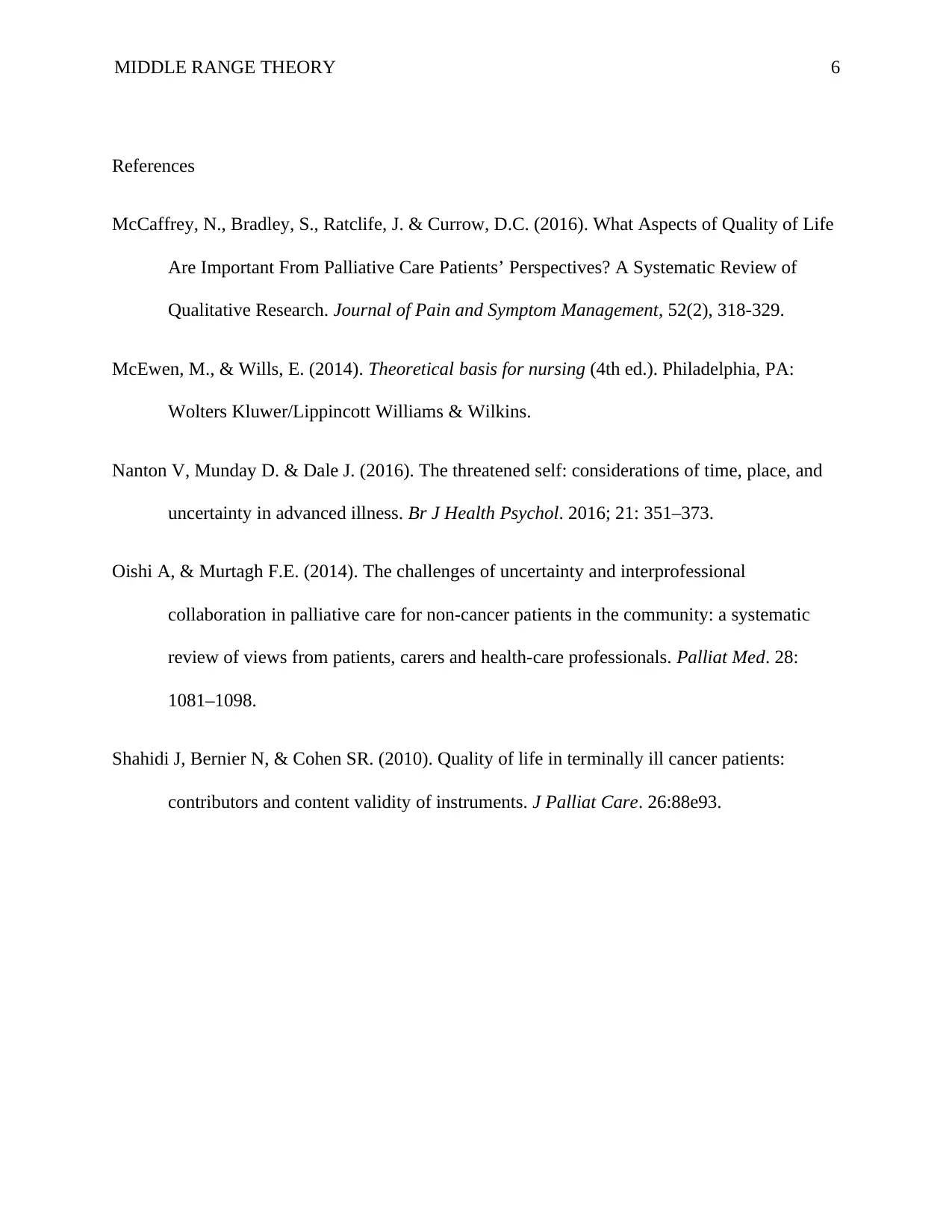
MIDDLE RANGE THEORY 6
References
McCaffrey, N., Bradley, S., Ratclife, J. & Currow, D.C. (2016). What Aspects of Quality of Life
Are Important From Palliative Care Patients’ Perspectives? A Systematic Review of
Qualitative Research. Journal of Pain and Symptom Management, 52(2), 318-329.
McEwen, M., & Wills, E. (2014). Theoretical basis for nursing (4th ed.). Philadelphia, PA:
Wolters Kluwer/Lippincott Williams & Wilkins.
Nanton V, Munday D. & Dale J. (2016). The threatened self: considerations of time, place, and
uncertainty in advanced illness. Br J Health Psychol. 2016; 21: 351–373.
Oishi A, & Murtagh F.E. (2014). The challenges of uncertainty and interprofessional
collaboration in palliative care for non-cancer patients in the community: a systematic
review of views from patients, carers and health-care professionals. Palliat Med. 28:
1081–1098.
Shahidi J, Bernier N, & Cohen SR. (2010). Quality of life in terminally ill cancer patients:
contributors and content validity of instruments. J Palliat Care. 26:88e93.
References
McCaffrey, N., Bradley, S., Ratclife, J. & Currow, D.C. (2016). What Aspects of Quality of Life
Are Important From Palliative Care Patients’ Perspectives? A Systematic Review of
Qualitative Research. Journal of Pain and Symptom Management, 52(2), 318-329.
McEwen, M., & Wills, E. (2014). Theoretical basis for nursing (4th ed.). Philadelphia, PA:
Wolters Kluwer/Lippincott Williams & Wilkins.
Nanton V, Munday D. & Dale J. (2016). The threatened self: considerations of time, place, and
uncertainty in advanced illness. Br J Health Psychol. 2016; 21: 351–373.
Oishi A, & Murtagh F.E. (2014). The challenges of uncertainty and interprofessional
collaboration in palliative care for non-cancer patients in the community: a systematic
review of views from patients, carers and health-care professionals. Palliat Med. 28:
1081–1098.
Shahidi J, Bernier N, & Cohen SR. (2010). Quality of life in terminally ill cancer patients:
contributors and content validity of instruments. J Palliat Care. 26:88e93.
⊘ This is a preview!⊘
Do you want full access?
Subscribe today to unlock all pages.

Trusted by 1+ million students worldwide
1 out of 6
Related Documents
Your All-in-One AI-Powered Toolkit for Academic Success.
+13062052269
info@desklib.com
Available 24*7 on WhatsApp / Email
![[object Object]](/_next/static/media/star-bottom.7253800d.svg)
Unlock your academic potential
Copyright © 2020–2026 A2Z Services. All Rights Reserved. Developed and managed by ZUCOL.





